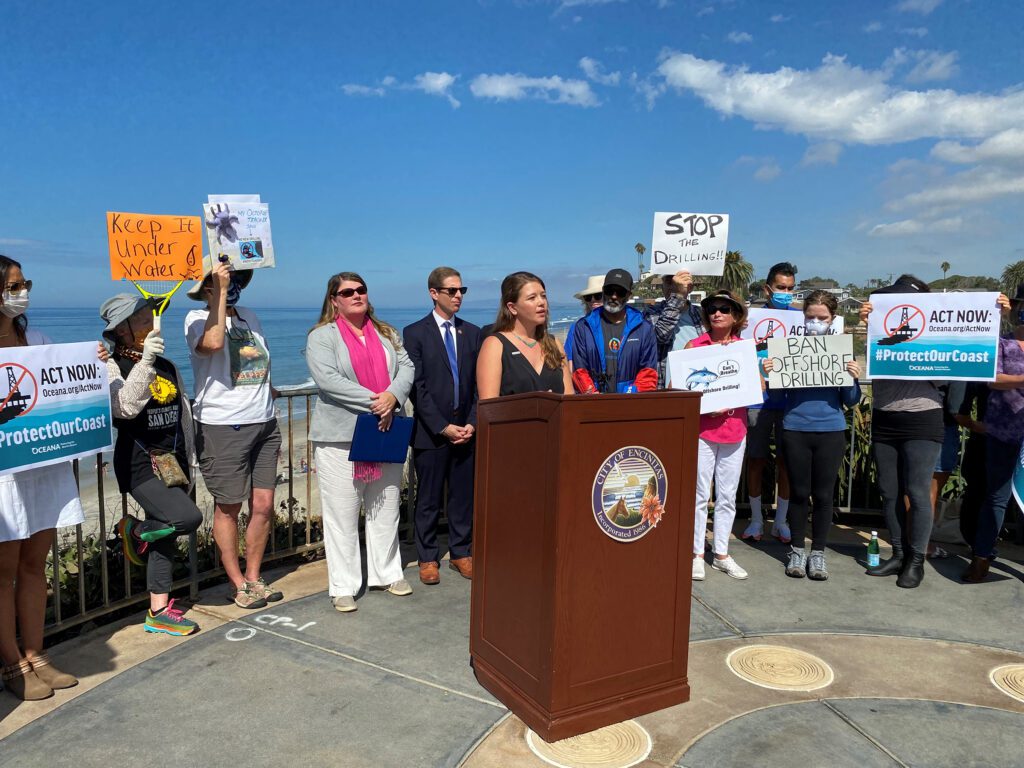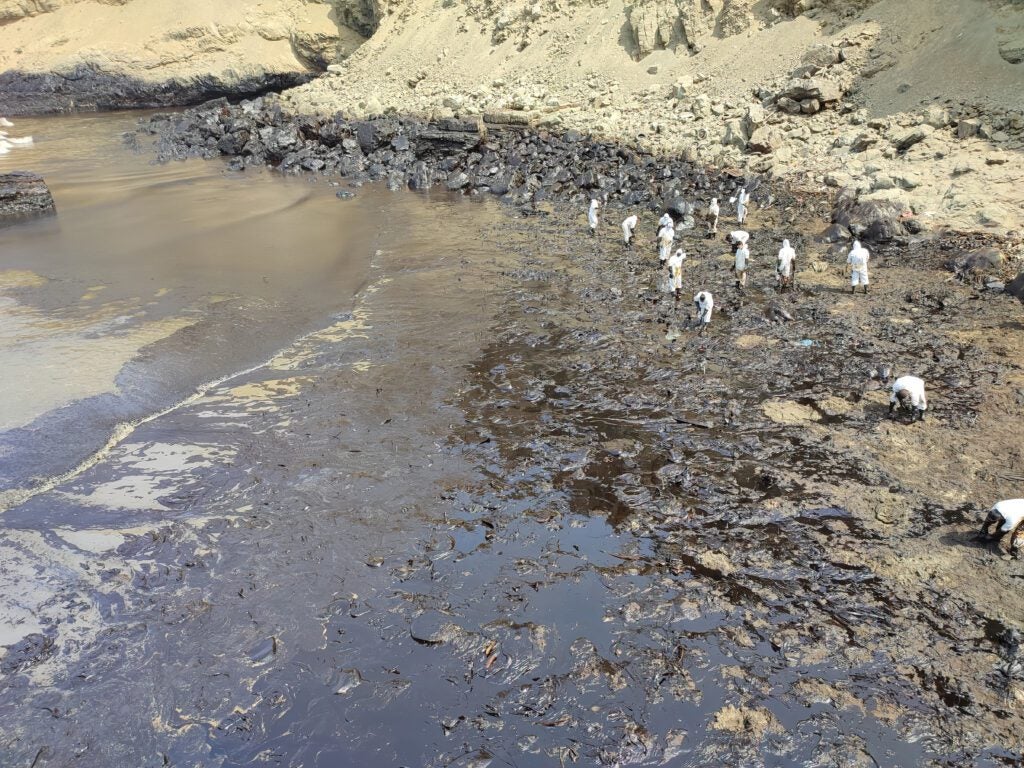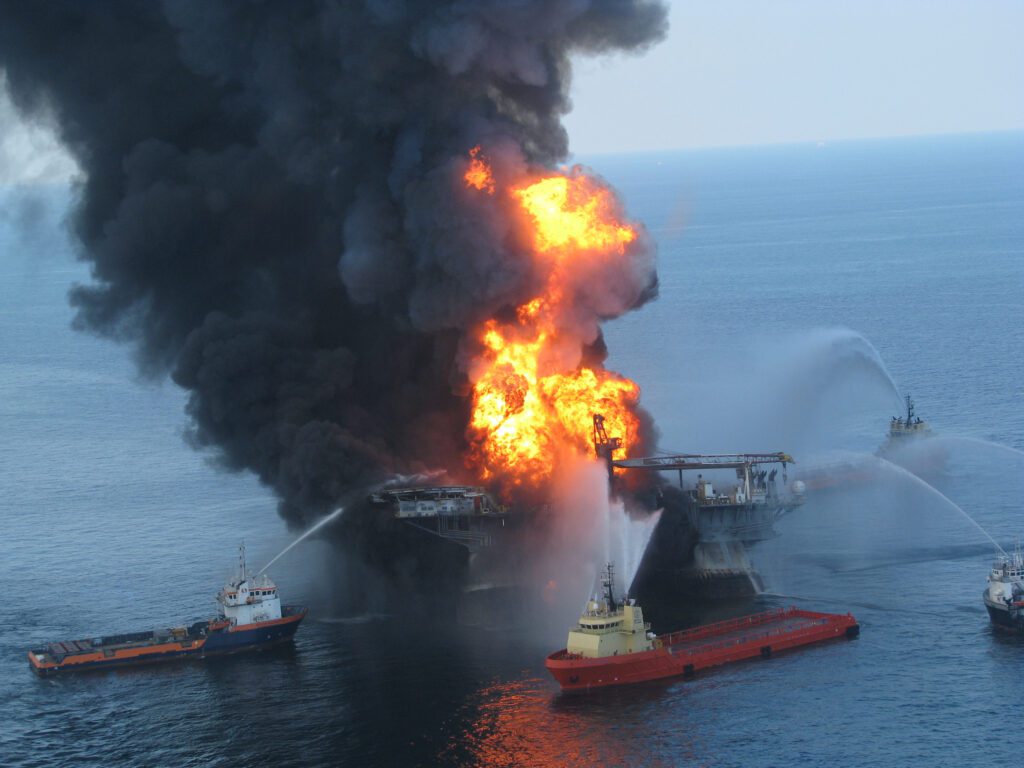May 3, 2022
Where they drill, they spill: Offshore drilling is dirty, dangerous, and drives climate change
BY: Emily Nuñez
Sarah Bedolfe was visiting Laguna Beach in California last October, but the sunshine was overshadowed by some troubling news. Hours earlier, media began reporting an oil spill off the coast of Huntington Beach, just a short drive from where Bedolfe, her family, and friends were enjoying their day.
It was not immediately clear how much had spilled or how far the slick might spread. Bedolfe remembers thinking to herself, “How long will it be before I can swim in the ocean again?”
As a marine scientist with Oceana, she knew that oil spills were an ever-present threat, but this one felt personal. The beaches south of Los Angeles were where she learned how to surf, attended junior lifeguard camp in the summer, and got her scuba diving certification.
She watched in horror as signs reading “The water is closed” and “Do not pick up tar balls” started appearing on beaches, and as clumps of oil, dead fish, and dead birds washed in with the tide. The mayor of Newport Beach reportedly saw dolphins swimming through the oil slick, which coated 13 square miles of water (or 34 square kilometers) with 25,000 gallons (95 metric tons) of oil.
The affected area also includes ecologically important wetlands that are home to around 90 species of bird, which are often the first animals to be killed by oil.
This spill is not an anomaly in an industry that repeatedly fails to prevent the worst-case scenario. Just three months after Huntington Beach, a tanker spilled oil off the coast of Lima, contaminating two protected areas in an incredibly biodiverse region and triggering the “worst ecological disaster” in Peru’s recent history. This was followed closely by the explosion of an oil processing ship off the coast of Nigeria with 10 crewmembers aboard, as well as two spills in a span of three weeks off the coast of Thailand’s Rayong province.
Oceana believes that when it comes to offshore drilling, the question is not whether they will spill — it’s when, where, and how much. In addition to marine pollution, offshore drilling generates carbon dioxide and methane emissions. These greenhouse gases contribute to climate change, which exacerbates the storms that are damaging oil and gas infrastructure and triggering more spills.
We cannot afford to wait and see which coastal community will be hit next. Following campaigning by Oceana, Belize’s government placed an indefinite moratorium on offshore oil drilling, acknowledging the havoc an oil spill could wreak on the country’s reef, fisheries, and jobs. Oceana is now working to hold fossil fuel companies accountable around the world and stop the expansion of offshore oil in the United States — before the next blowout occurs.

‘The only way to protect our ocean’
Oil spills are disastrous to coastal economies and workers. In the aftermath of the Huntington Beach spill, tourists canceled hotel reservations, city organizers called off a popular air show, boaters lost access to harbors, and local fisheries closed due to health and safety concerns.
U.S. Rep. Mike Levin, who represents southern Orange County and northern San Diego County, said this is not the first spill to affect California’s beaches, nor will it be the last if offshore drilling isn’t stopped. He introduced legislation that would prohibit new leasing for offshore oil drilling along the Southern California coast, citing the need to cut emissions and protect coastal communities.
“Along with the 1969 Santa Barbara blowout and the Refugio Beach spill of 2015, fossil fuel companies have released more than 4 million gallons of oil into the Pacific Ocean,” Levin said. “Clearly, the only way to protect our ocean and our coastal economy is to end dangerous offshore drilling activity along California once and for all. I’m proud to lead that effort in Congress, and I will keep fighting to get it done.”
In the U.S. alone, there were at least 5,900 oil spills between 2010 and 2019 — an average of almost two spills per day. That figure doesn’t even begin to account for all the offshore oil spills that occur around the world, many of which go unreported and undetected. According to a recent analysis of satellite images from West Africa, the amount of oil silently spilled into the Gulf of Guinea over a 10-year span may have exceeded that of BP’s Deepwater Horizon spill in the Gulf of Mexico. Some of the spills off West Africa’s coast were reported, but others likely were not.
This is a familiar tale. Oceana asserts that Repsol, a Spanish energy company, underestimated the amount of oil spilled into Peru’s ocean and squandered time that could have been spent mitigating the damage. While unloading crude oil at a Repsol refinery, a tanker was struck by powerful waves triggered by an underwater volcano eruption near Tonga. Repsol initially claimed the spill was “limited” and “contained,” and that only 7 gallons of oil had leaked, according to The New York Times.
About 250,000 gallons later, oil has coated coastlines, killed penguins and seabirds, and put hundreds of small-scale fishers out of work. It also threatens two protected areas that are home to Humboldt penguins, sea otters, and other iconic marine life. Daniel Olivares, Oceana’s leader in Peru, said Repsol must be held accountable for this disaster.
“They continued to process oil despite dangerous conditions at sea and have since failed to take appropriate actions to address the aftermath,” Olivares said. “Peru needs to reassess its reliance on fossil fuels and promote an energy transition that gradually frees us from this dirty and dangerous practice that is hurting our oceans and greatly contributing to climate change.”
Around the world, citizens are demanding that their coasts and livelihoods be protected from offshore drilling. Now, it’s a matter of getting governments to listen.

Clean coasts aren’t controversial
After the Huntington Beach oil spill, the city became the 100th community on the West Coast to pass a resolution opposing new offshore drilling. Combined, these communities represent more than 26 million people.
It isn’t just “blue states” that are speaking up, either. Almost every East and West Coast governor — Democrats and Republicans alike — opposes the expansion of offshore drilling activities. Joining them are over 2,300 local, state, and federal bipartisan officials; alliances representing over 56,000 businesses; Pacific, New England, South Atlantic, and Mid-Atlantic fishery management councils; more than 120 scientists; and more than 80 former military leaders.
An Oceana analysis found that ending new leasing for offshore oil and gas in the U.S. could prevent over 19 billion metric tons of greenhouse gas emissions, or the equivalent of taking every car in the U.S. off the road for 15 years. It could also prevent more than $720 billion in damages and protect the 3.3 million jobs and $250 billion in GDP that depend on a clean coast economy.
Oceana campaign director Diane Hoskins said that once communities understand what’s at stake, it becomes clear that offshore oil operations are a ticking time bomb.
“It’s a no-brainer for folks on the coast,” Hoskins said. “The threat of an oil disaster is too great, and folks don’t want oil sludge washing up on their beaches.”
Take Deepwater Horizon, for example. When BP’s oil drilling platform exploded in the Gulf of Mexico in 2010, killing 11 workers and unleashing the worst oil spill in U.S. history, it disrupted marine ecosystems and devastated the coastal economies of five Gulf Coast states.
Oil washed up on 1,300 miles (2,092 kilometers) of shoreline between Texas and Florida and killed tens of thousands of birds, sea turtles, dolphins, and fish. Restoration projects have been underway for the last decade and will continue for at least another decade.
Offshore oil drilling is “simply not worth the risk” of another Deepwater Horizon, said U.S. Rep. Kathy Castor, who represents Hillsborough County, including the city of Tampa, and heads the House Select Committee on the Climate Crisis. In both the current and previous Congress, the House passed legislation inspired by her Florida Coastal Protection Act, which would permanently ban oil drilling off Florida’s coast permanently.
“Florida’s beautiful beaches, our economy, and our way of life are tied to clean water and clean beaches. Oil drilling off our coast poses a direct threat to our pocketbooks and natural environment,” Castor said. “Floridians have not forgotten the devastation of the BP Deepwater Horizon disaster. We have an obligation to act now to protect our beautiful Florida coastline, our wildlife, and our future.”
Bills like these are being introduced across the country and building momentum for something even bigger: a nationwide law that would bring the expansion of offshore oil drilling to a halt.

Building a better future
Creating a broad, bipartisan coalition has been central to Oceana’s offshore drilling campaign in the U.S., which rallies grassroots opposition to offshore drilling at the local, state, and federal levels. In September 2020, this culminated in then-President Donald Trump scrapping his plan to open nearly all U.S. waters to offshore drilling. Instead, he made offshore oil and gas leasing off limits in Florida, Georgia, South Carolina, and North Carolina for 10 years, as of July 1, 2022.
It was an important victory, but the work won’t end until all coastal states are protected from new offshore drilling. This goal seemed within reach when President Joe Biden took office and vowed to ban “new oil and gas permitting on public lands and waters.”
The ambitious budget reconciliation bill he championed, called Build Back Better, contained a provision that would permanently ban future offshore oil and gas leasing in the Pacific, Atlantic, and Eastern Gulf of Mexico. The bill passed through the House, but with Senate Republicans united in opposition, it needed the support of every Democrat in the Senate to make its way to the president’s desk. Months later, the package remains stalled.
Build Back Better isn’t the only means of achieving an offshore drilling ban, though. President Biden has the authority to take executive action on offshore oil drilling, just as former President Trump did. Oceana is urging the Biden administration to seize the opportunity to protect our oceans and coastal communities, once and for all.
“Oceana and its allies are calling on the president to uphold his commitment to protecting our communities, our climate, and our economy from the threat of offshore drilling,” Hoskins said. “Our oceans can and must be a major part of our clean energy future through clean energy like offshore wind, but the time for President Biden and Congress to act is now.”
This story appears in the Climate Issue (Spring 2022) of Oceana Magazine. Read it online here.



